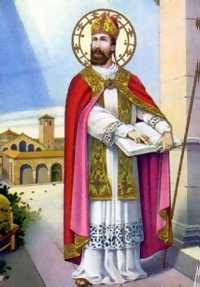

Ambrose (Ambrogio in Italian) was born in Gaul, where his father,
who belonged to the Roman nobility, was praetorian prefect. Still very young, Ambrose became a barrister at Rome, and before
his thirty-fifth year he was appointed governor of Liguria and Aemilia with his headquarters at Milan. The whole province was
rent by the Arian controversy. When the bishop of Milan died in 374, Ambrose, being governor, went to the cathedral to ensure
peace and order in the new election, with the result that he himself, though a catechumen, was elected by acclamation, after
a child had been suddenly heard to cry out "Ambrose for bishop". Ambrose's objections were overruled, and he was ordained on
December 7th, 374 (the day on which his feast now is celebrated). He proved to be one of the greatest and most beloved bishops of
all time. He excelled as an administrator, as a writer, as the "hammer of Arianism". He was prompt and outspoken in withstanding
the tyranny of the emperors. His courage in reproving Theodosius the Great was a noble example of Christian heroism. Ambrose
died on Good Friday, April 4th, 397. He is one of the four great Latin Fathers and Doctors. His symbol is a scourge; or a beehive
(to represent the sweetness of his eloquence).
"No one heals himself by wounding another." - Saint Ambrose